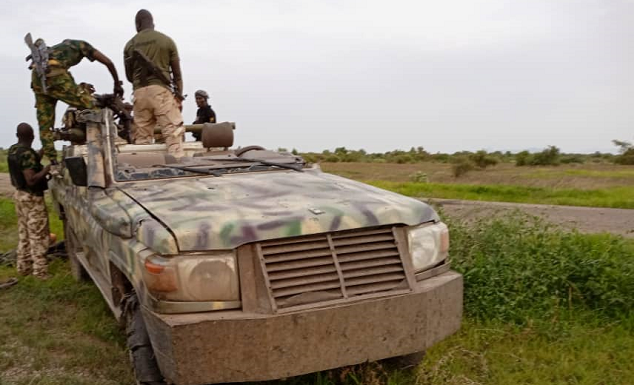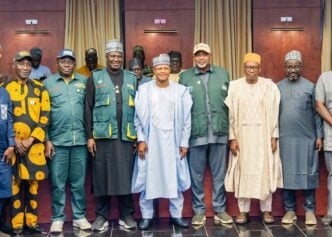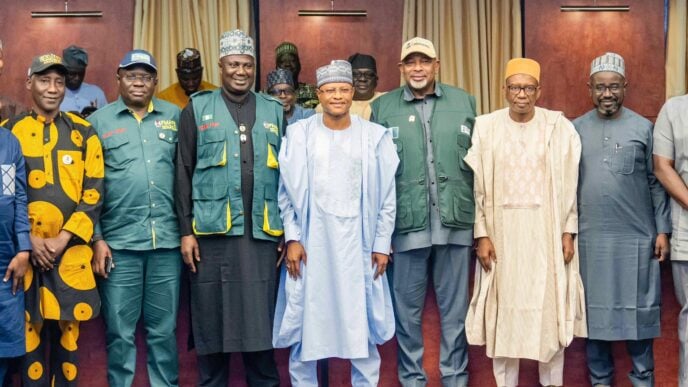Nigerian troops | File photo
BY TOSIN ADEOTI
Donald Trump’s latest outburst about Nigeria was classic Trump — loud, reckless, and dripping with self-righteousness. Speaking aboard Air Force One, he accused the Nigerian government of “failing to protect Christians” and warned that the United States might “take military action” if the killings continued. It was the kind of bombast designed for applause, not diplomacy.
But while the remark briefly rattled markets, Nigeria’s 2051 Eurobond dipped before quickly rebounding to 92 cents on the dollar, the deeper question it raises is uncomfortable: why does Nigeria remain so easy a target for this kind of moral posturing?
The answer, painfully, is that the country’s internal failures create the space for others to speak so carelessly.
Advertisement
Trump’s comments were unhelpfully framed, yet they touched a grain of truth: there is indeed deep insecurity in the land, and the Nigerian government has not done nearly enough to curb it. In the past decade, more than 60,000 people have died in conflicts ranging from Boko Haram’s insurgency in the northeast to banditry in the northwest, and communal violence across the Middle Belt. Kidnapping for ransom has become a thriving industry, while large portions of rural Nigeria have slipped into the hands of militias and criminal gangs.
The result is a country where fear is a daily fact of life. Travelling by road between major cities requires prayer. Farmers abandon fields for fear of raids. Parents in Kaduna or Zamfara dread sending their children to school. Yet, even amid these grim realities, the federal government often communicates as though insecurity is a PR problem rather than a crisis of governance.
When Trump accused Nigeria of “failing to protect Christians,” Abuja’s first instinct was not to clarify or inform, but to deny and deflect. Presidential adviser Daniel Bwala dismissed the comments as “an insult to national sovereignty,” insisting that both Christians and Muslims were victims of extremist violence. That statement was true but shallow. It dodged the underlying issue: why are Nigerians, regardless of faith, so vulnerable in the first place?
Advertisement
Nigeria’s security failures are not born of religious persecution; they are the product of a broken state. The federal structure concentrates power but diffuses responsibility. Governors blame Abuja, Abuja blames local authorities, and the security agencies blame a lack of intelligence or logistics. Meanwhile, citizens bury their dead.
For years, governments have responded to insecurity with the same predictable pattern: reshuffle the service chiefs, convene committees, promise reforms, and issue warnings. Little changes. Coordination between security agencies remains weak. Police funding is pitiful. Rural intelligence networks are non-existent. Even when progress is made, as in the reduction of Boko Haram’s territorial control, new crises erupt elsewhere.
Against that backdrop, Trump’s rhetoric, as offensive as it was, found oxygen in the vacuum of credibility that Nigeria’s government has created. The real scandal is not that the U.S. president made an outrageous threat; it’s that the Nigerian state has become too incoherent, too unconvincing, to effectively defend itself.
For over a year, Nigeria has had no confirmed ambassador in Washington. Its foreign missions operate on thin budgets, often unable to mount even basic public diplomacy campaigns. The Ministry of Foreign Affairs is treated as an afterthought, its strategic functions drowned by political appointments.
Advertisement
Abuja seems perpetually surprised when criticism arrives, even though it is often predictable and, in some ways, deserved.
The tragedy is that Nigeria is not a helpless country. It remains one of Africa’s largest economies. President Tinubu’s economic decisions — the removal of fuel subsidies, exchange-rate unification — have begun to restore investor confidence. Inflation is easing. The naira has started to stabilise. Yet, this fragile progress risks being overshadowed by the chaos within.
Without security, reform cannot take root. And without credible communication, reform cannot inspire confidence.
The problem is not just insecurity itself, but the government’s tone-deaf handling of it. Each time violence erupts, whether in Plateau, Benue, or Zamfara, the response is formulaic: condemnation, condolence, and silence. There is little transparency about what the government is actually doing. Casualty figures are disputed. Military operations are shrouded in secrecy.
Advertisement
This opacity breeds cynicism at home and misunderstanding abroad. In the absence of reliable information, foreign governments, NGOs, and commentators fill the vacuum with their own narratives — often crude, sometimes prejudiced, but never fully wrong.
Nigeria once had a foreign policy posture that inspired respect. From the 1970s through the 1980s, and especially in the 2000s, it championed anti-apartheid struggles and mediated regional conflicts. Today, that confidence has withered.
Advertisement
So when crises erupt, the government reacts rather than leads. It protests indignantly, but belatedly. It trades in outrage rather than persuasion. And it leaves the impression, at home and abroad, that Nigeria no longer knows how to speak for itself.
Trump’s words should not enrage Nigeria; they should embarrass it. They should force a reckoning with the disrepair of its institutions and the weakness of its global voice.
Advertisement
It is easy to condemn the arrogance of foreign critics. It is harder to confront the domestic dysfunction that makes their criticism believable.
Nigeria needs more than economic reform. It needs administrative competence and a clear foreign policy vision that reclaims its story from the hands of others. Appoint ambassadors. Empower the foreign service. Communicate transparently. Invest in intelligence, policing, and the rule of law.
Advertisement
For too long, Nigeria has mistaken indignation for strength. But in the world of diplomacy, credibility — not bluster — earns respect.
Until Abuja learns that lesson, even careless rhetoric from abroad will continue to find a home here, not because it is true, but because it sounds plausible.
Tosin Adeoti writes on society, governance, and business, weaving history and observation into stories about how people and nations evolve. He is interested in ideas that help us build fairer and more thoughtful communities. He can be contacted via [email protected].
Views expressed by contributors are strictly personal and not of TheCable.


